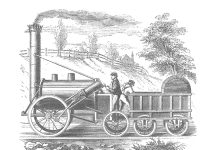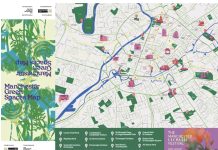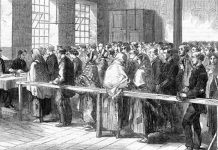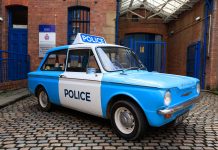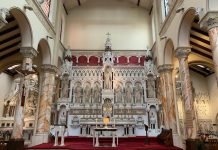It started with a walk to a gig in Manchester, past archeological diggings around what is now the site of the new Co-op headquarters in Manchester.
Dean Kirby, then a journalist working at the Manchester Evening News, realized that the house of his great great great Grandfather William was being excavated.
Already with his father trying to research his family history, the archeology brought the life of the Irish Immigrant to life, Dean was able to walk through the front door of the house, explore the Privy that his ancestor shared with over one hundred people and emptied into the River Irk and examine how the walls of the houses were just half a brick thick.
This was the world of Angel Meadow, called by Dean Victorian Britain’s most savage slum where the social consequences of Manchester’s rapid industrialization were laid bear.As Dean writes ” by the spring of 1893, violence and poverty had become engrained in the bricks and mortar of the slums lodging houses, factoried and beer shops.”
William Kirby was a fishmonger, his wife Ellen made her living selling fish heads around the streets, only three of their seven children survived to adulthood, one also named William lived for just two weeks and the archeological dig began on the anniversary of his birth.
Engels would visit the area and would write
“Here all the features of a city are lost. Single rows of houses or groups of streets stand, here and there, like little villages, be they naked, not even grass grown soil; the houses, or rather cottages, are in bad order, never repaired, filthy, with damp, unclean cellar dwellings; the lanes are neither paved nor supplied with sewers.”
These were the people who gave Laudenam to their children to keep them quiet , yet it would also see the setting of Charter schools.Amongst the squalor and the violence there was hope. Here lived the people that he,led to build Manchester, and the people that fought back against the condition, injured and killed at Peterloo and central to the burgeoning Chartist movement of the 1830-40’s.
As Manchester began to clear its slums between the wars, G. A. Studdert Kennedy would visit and would write “Would not these eyes, that saw their angel gazing Into the brightness of the fathers face.Turn on this slum with love and fury blazin, Shriveling our souls with shame of such”.
Goering’s Luftwaffe would see the end to the slums, and the area became an unfashionable backwater filled with empty warehouse and broken buildings. Today it is being transformed but as Dean writes
“If you sit for long enough on the bench in the old burying ground on a winter’s afternoon and peer across the upper black windows of the Charter Street Ragged School….the ghosts of the past start tugging at your sleeve”
Angel Meadow by Dean Kirby is available through Pen and Sword Books
More info www.angelMeadowbook.com


